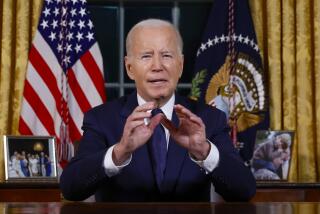Shevardnadze’s Departure Rekindles Nagging Western Fears
- Share via
MOSCOW — The resignation of Soviet Foreign Minister Eduard A. Shevardnadze has rekindled Western fears that changes in the Kremlin’s foreign policy in recent years might be too good to last.
Although President Mikhail S. Gorbachev reassured foreign governments again Friday that Soviet policies would remain unchanged, senior diplomats assessing Shevardnadze’s departure see serious dangers that stem, first of all, from the domestic turmoil here.
“Political instability at home makes for a weak foreign policy--that is axiomatic,” a West European ambassador commented here. “Certainly, the dimensions of the Soviet economic crisis will mean instability for several years, and the drama of Shevardnadze’s departure makes that all the clearer. The Soviet Union’s international posture will change.”
But the changes are more likely to come over time, not immediately, for they affect the foundations of foreign policy and the way in which it is formulated more than issues of the moment, according to diplomats and Soviet foreign affairs analysts. And the character and scope of those changes depend on resolution of the present crisis.
“The United States can probably still look for help in the current gulf crisis,” another European ambassador remarked, “but not the next crisis, wherever it is. The present arms agreements will be concluded, signed and ratified, but the next will be tougher going. The summit with President Bush in February will go smoothly, but the next summit could prove very difficult.
“The point is that the transformation of Soviet foreign policy of the past five years was due to the overall political shift here, to perestroika and glasnost. Now, we appear to be heading toward substantial changes domestically--Shevardnadze’s resignation is a clear signal of that--and this most likely means foreign policy changes.”
Soviet officials sought again Friday to reassure the international community that “new political thinking,” as Moscow calls its foreign policy under Gorbachev, is “immutable.”
“This line of the Soviet Union will remain unchanged,” Vladimir F. Petrovsky, a first deputy foreign minister, said of the present foreign policy. “All suppositions, guesses and hopes for changes in Soviet foreign policy are groundless.”
Petrovsky and other Soviet officials contended Friday, in arguments directed both to their own countrymen and to the rest of the world, that not only can there be no return to the Kremlin’s previous foreign policies but that the present approach is the only one that meets the country’s needs.
“The main achievement is that conditions have been created for our country to surmount very serious domestic problems and difficulties,” Petrovsky said. “I believe that is why the Congress of People’s Deputies has unanimously supported the proposal to reaffirm the immutability of our foreign policy.”
But Leonid Mlechin, a commentator for the weekly magazine New Times, said the pressure under which Shevardnadze had come and his resulting resignation was already affecting Soviet foreign policy.
“There could not be a clearer signal to the world that our right-wingers and our military-industrial complex do not want arms reductions or collaboration with the West,” Mlechin argued.
“If they were to gain power, we might well see foreign policy revert to a ‘class basis’ and the confrontation with ‘imperialism’ that this would mean.”
The conservatives have fumed for two years over that ideological shift in Soviet foreign policy, but their current concerns are German reunification, the “loss” of Soviet satellites in Eastern Europe, the steep cuts in the Red Army under the new arms reduction agreement and, most recently, cooperation with the United States in the Persian Gulf.
Accusing Shevardnadze of committing Soviet troops to a war with Iraq over Kuwait, the conservatives have been able to exploit the widespread desire to avoid further foreign conflicts--”Let Afghanistan be the last,” as Shevardnadze puts it--and make the Soviet Union look like an instrument of U.S. policy in the gulf.
Sergei Blagovolin, a senior fellow at the Institute of World Economy and International Relations, a leading Moscow think tank, described Shevardnadze’s resignation as the result, in part, of growing conflict over Soviet foreign policy, even over some developments widely hailed as its major achievements.
“Shevardnadze is sick and tired of struggling alone with conservative forces,” Blagovolin said. “He is also afraid that the president is under tremendous pressure from the right wing, and they have already succeeded in causing him to shift to the right. The resignation thus was a sign of a split between the president and Shevardnadze.”
A Western ambassador summed up the new interplay between Soviet domestic politics and foreign policy rather tartly: “If Eduard Shevardnadze had spent as much time with his president in the past six months as he has with the American secretary of state, then we might well not have had this break between them.”
Gorbachev reportedly is still trying to persuade Shevardnadze to remain, perhaps as an adviser rather than foreign minister. But regardless of the outcome, diplomats see Shevardnadze’s resignation as a testing time for Soviet foreign policy.
“One man does not make a country’s foreign policy, but it is precisely perestroika that is the real target of the right, not Shevardnadze personally,” a Central European ambassador said, asking like the others not to be quoted by name.
“If perestroika is now rejected in the domestic battle, then ‘new political thinking’ is left without a foundation, and it could not survive. That is what concerns us.”
In assessing the likely impact of Shevardnadze’s resignation, Western and Soviet foreign policy analysts make three points in predicting changes:
* Foreign policy was a direct issue in Shevardnadze’s resignation, and that signifies trouble particularly on issues like the Persian Gulf crisis, German reunification and arms reduction.
* Soviet foreign policy, broadly, is now a domestic political issue, actively debated in Parliament and the press, in a way that it was never before, and this will limit the maneuvering room of any foreign minister.
* Finally, the present foreign policy is identified with Gorbachev, who himself is in the midst of a major political and economic crisis and has come under attack from the right on foreign policy as well as other issues.
More to Read
Sign up for Essential California
The most important California stories and recommendations in your inbox every morning.
You may occasionally receive promotional content from the Los Angeles Times.













